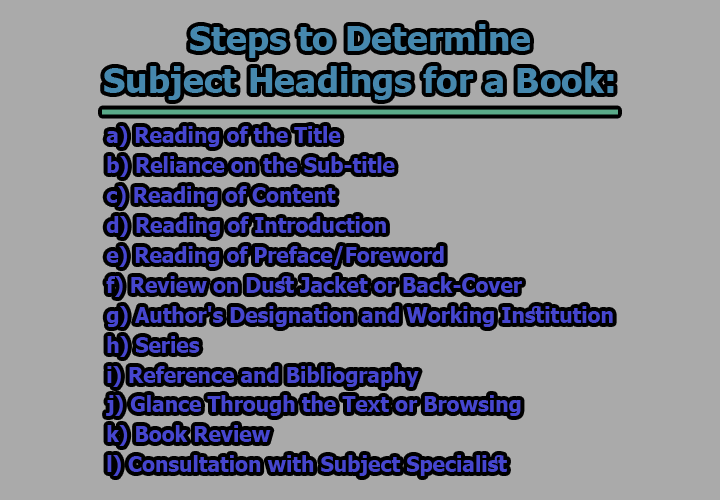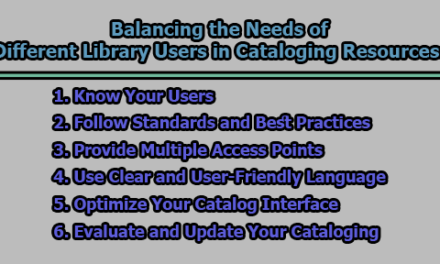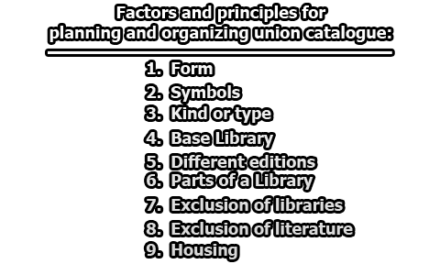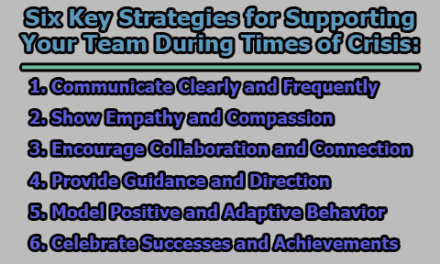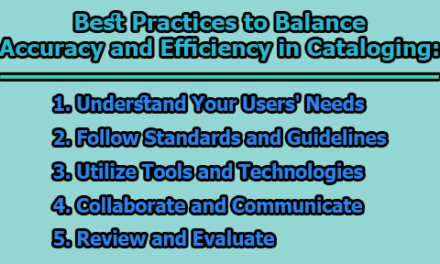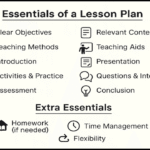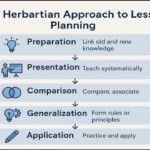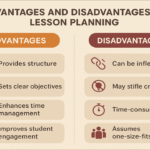Steps to Determine Subject Headings for a Book:
When it comes to organizing and categorizing books in a library or conducting research, determining accurate subject headings is crucial. The subject headings assigned to a book help users find relevant materials efficiently and ensure that the collection is well-organized. However, reading the title alone may not always be sufficient to determine the subject of a book, especially if the title is abstract or misleading. This article presents a guide for understanding the steps to determine subject headings for a book.
a) Reading of the Title: The title of a book is the first piece of information that catches the reader’s attention. While some book titles are self-explanatory and directly indicate the subject matter, many titles can be abstract or misleading. As a result, solely relying on the title to determine the subject of a book may lead to inaccuracies in categorization.
For instance, a title like “The Enigma of the Cosmos” does not provide a clear indication of the subject, leaving room for interpretation. In contrast, a title like “Introduction to Quantum Mechanics” offers a straightforward understanding of the book’s subject, which is quantum mechanics.
b) Reliance on the Sub-title: When the main title is not explicit enough to identify the subject, the sub-title can be a valuable source of information. The sub-title often elaborates on the main title, providing additional context and clarity about the book’s subject matter.
Continuing from the previous example, the sub-title of “The Enigma of the Cosmos: Unraveling the Mysteries of Dark Matter” offers more specific information, indicating that the book is about dark matter and cosmology.
c) Reading of Content: If the title and sub-title do not sufficiently clarify the subject, a thorough reading of the book’s content becomes essential. This step involves skimming through the chapters, headings, and sections to grasp the overall scope and coverage of the subject.
During this process, readers should pay attention to the main themes and topics discussed, as well as any recurring patterns or subject-related keywords. This careful reading allows librarians and researchers to identify multiple subjects or related areas covered in the book.
d) Reading of Introduction: The introduction of a book serves as a crucial section that amplifies the text and briefly explains the author’s point of view or intentions for writing the book. This section often provides insights into the book’s primary focus, contributing to a clearer understanding of the subject matter.
In academic works, the introduction typically outlines the research questions, objectives, and methodology, while in literature, it might introduce the central themes and characters. By analyzing the introduction, one can narrow down the book’s subject and its relevance to a specific field of study.
e) Reading of Preface/Foreword: The preface or foreword, usually written by the author or a distinguished expert, offers additional context and insight into the book. It serves as a key to understanding the author’s intentions, motivations, and objectives in writing the book.
Prefaces often provide a glimpse into the author’s background, experiences, and reason for choosing the subject matter. This information is valuable in determining the subject’s scope and relevance to specific audiences.
f) Review on Dust Jacket or Back Cover: The publisher’s review, typically found on the dust jacket or back cover of the book, is an excellent resource for understanding the subject matter. This review not only clarifies the book’s subject but also indicates the intended target audience, recommended standards, or academic courses for which the book is suitable.
Additionally, the review might contain background information about the subject and offer a brief bibliography of the author, highlighting their expertise in the field.
g) Author’s Designation and Working Institution: Information about the author’s designation and working institution can provide further clues about the subject matter. If the author’s designation is in a specific field, it is reasonable to assume that the book revolves around that subject or its related areas.
For example, a book written by a professor of astrophysics from a renowned research institution is likely to be about astrophysics or related cosmological topics.
h) Series: If the book is part of a series, the series title can offer a broad indication of the subject. Series often focus on specific subjects or themes, making it easier to categorize the book accordingly.
For instance, if a book is part of the “McGraw-Hill Science and Technology Series,” it is likely related to science and technology topics.
i) Reference and Bibliography: Examining the references and bibliography cited in the book can provide valuable insights into its subject area. The sources mentioned in the book can reveal the main subject and its allied areas.
By identifying the key works and authors referenced, librarians and researchers can gauge the book’s contribution to the field and its relationship to existing knowledge.
j) Glance Through the Text or Browsing: Taking a deeper dive into the book itself and reading specific passages that seem particularly important can provide focus on the broad areas treated in the book.
By reading selected sections, such as chapter summaries or significant arguments, librarians and researchers can gain a broader understanding of the subject and confirm its categorization.
k) Book Review: Reviews from reputable sources like the Book Review Digest (BRD) or other periodicals can offer another means of determining the book’s subject. Book reviews often provide an impartial assessment of the book’s content, highlighting its strengths and weaknesses, and may shed light on its subject matter.
Reviewers often discuss the book’s main themes and contributions to the field, which can aid in accurately assigning subject headings.
l) Consultation with Subject Specialist: If all the previous efforts fail to determine the subject accurately, seeking advice from a subject specialist is a valuable option. Subject specialists possess expertise in specific fields and can provide valuable insights to aid in the categorization process.
By consulting with a subject specialist, librarians and researchers can ensure that the book is categorized correctly and made accessible to the appropriate audience.
In conclusion, determining subject headings for books is a complex process that requires a combination of methods and careful consideration. While the title and sub-title may provide direct indications of the subject in some cases, reading the content, introduction, preface, dust jacket reviews, and bibliographies is often necessary to gain a comprehensive understanding of the subject matter. Additionally, consulting with subject specialists can be invaluable when faced with challenging categorization. By following these systematic steps, librarians and researchers can ensure a well-organized collection and facilitate easier access to relevant information for library users and researchers alike.
Frequently Asked Questions [FAQs]:
Why is it important to determine accurate subject headings for books?
Determining accurate subject headings for books is crucial for effective library management and academic research. Subject headings help users find relevant materials efficiently, improving the overall user experience. Additionally, well-organized subject headings ensure that the collection is accessible and easily navigable for library patrons and researchers.
Can the subject of a book always be determined by reading the title alone?
No, determining the subject solely by reading the title is not always advisable. Many book titles are abstract or generalized, which may be misleading. While some titles may directly indicate the subject matter, others require further examination of the content, sub-title, and other relevant information to determine the accurate subject heading.
How can a librarian determine the subject when the title is not clear?
When the title is not clear, librarians can employ various methods. They can read the sub-title, the book’s content, the introduction, and the preface to gain a deeper understanding of the subject matter. Additionally, reviewing the dust jacket or back cover, considering the author’s designation and working institution, examining references and bibliography, and consulting book reviews can provide valuable insights.
Can a book’s series be indicative of its subject?
Yes, a book’s series can offer a broad indication of its subject matter. Series often focus on specific subjects or themes, making it easier for librarians to categorize the book accordingly. For example, a book part of a series like “McGraw-Hill Science and Technology” is likely related to science and technology topics.
What role does a subject specialist play in determining subject headings?
A subject specialist possesses expertise in specific fields and can provide valuable insights when determining subject headings becomes challenging. By consulting with a subject specialist, librarians and researchers can ensure that the book is accurately categorized and made accessible to the appropriate audience.
How can browsing through the text help in determining the subject of a book?
Browsing through the text involves reading selected passages, such as the introduction and conclusion, to gain a broader understanding of the subject treated in the book. This approach allows librarians and researchers to focus on the main themes and topics discussed, aiding in accurately assigning subject headings.
Are book reviews reliable sources for understanding a book’s subject?
Yes, book reviews from reputable sources like the Book Review Digest (BRD) or other periodicals can be reliable sources for understanding a book’s subject matter. Reviewers often discuss the book’s main themes and contributions to the field, providing valuable insights to assist in assigning appropriate subject headings.
What should be the last resort if all other methods fail to determine the subject?
The last resort, when all other methods fail, is to consult with a subject specialist. Subject specialists have in-depth knowledge of specific fields and can help accurately determine the subject heading of a book that may be challenging to categorize through other means.
How do subject headings benefit researchers and library users?
Subject headings benefit researchers and library users by facilitating easy access to relevant materials. Researchers can find resources related to their topics of interest more efficiently, while library users can navigate the collection and discover books aligned with their specific needs.
Are subject headings standardized across all libraries?
Subject headings are often standardized within library catalogs, following established systems such as Library of Congress Subject Headings (LCSH) or Dewey Decimal Classification (DDC). However, individual libraries might also create their own local subject headings to cater to specific user needs.

Assistant Teacher at Zinzira Pir Mohammad Pilot School and College

